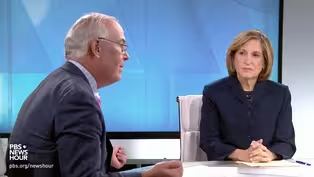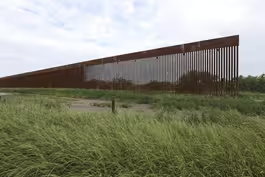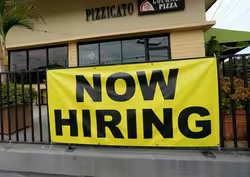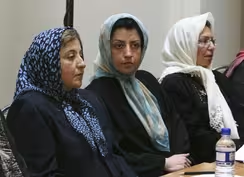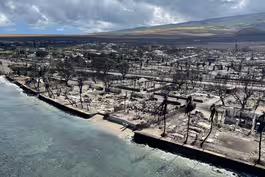
Nobel winner Maria Ressa on A.I dangers and defending truth
Clip: 10/6/2023 | 6m 50sVideo has Closed Captions
Nobel laureate Maria Ressa on defending truth and the danger of A.I. in the wrong hands
Veteran journalist and Nobel Peace Prize winner Maria Ressa has a dire warning about the defense of truth in the digital age. She says we risk losing the information war to adversarial artificial intelligence and to authoritarian governments who can weaponize the tech. Geoff Bennett spoke with Ressa at the inaugural summit of the newly launched Institute of Global Politics at Columbia University.
Problems playing video? | Closed Captioning Feedback
Problems playing video? | Closed Captioning Feedback
Major corporate funding for the PBS News Hour is provided by BDO, BNSF, Consumer Cellular, American Cruise Lines, and Raymond James. Funding for the PBS NewsHour Weekend is provided by...

Nobel winner Maria Ressa on A.I dangers and defending truth
Clip: 10/6/2023 | 6m 50sVideo has Closed Captions
Veteran journalist and Nobel Peace Prize winner Maria Ressa has a dire warning about the defense of truth in the digital age. She says we risk losing the information war to adversarial artificial intelligence and to authoritarian governments who can weaponize the tech. Geoff Bennett spoke with Ressa at the inaugural summit of the newly launched Institute of Global Politics at Columbia University.
Problems playing video? | Closed Captioning Feedback
How to Watch PBS News Hour
PBS News Hour is available to stream on pbs.org and the free PBS App, available on iPhone, Apple TV, Android TV, Android smartphones, Amazon Fire TV, Amazon Fire Tablet, Roku, Samsung Smart TV, and Vizio.
Providing Support for PBS.org
Learn Moreabout PBS online sponsorshipAMNA NAWAZ: Veteran journalist and past Nobel Peace Prize winner Maria Ressa has a dire warning about the defense of truth in the digital age.
She says we risk losing the information war to adversarial artificial intelligence and to authoritarian governments who can weaponize that technology.
And she's experienced it firsthand.
In 2021, she won the Nobel Prize for fighting to protect freedom of expression in the Philippines under attack by the regime of then-President Rodrigo Duterte.
Geoff Bennett spoke with Ressa this week at the inaugural summit of the newly launched Institute of Global Politics at Columbia University.
GEOFF BENNETT: Maria Ressa, thank you so much for speaking with us.
I appreciate it.
MARIA RESSA, CEO, Rappler: Thanks for having me.
GEOFF BENNETT: You have said the world faces a tech-enabled Armageddon, turbocharged by generative artificial intelligence.
Invoking Armageddon, sort of the final battle between good and evil, might strike some people as an overreach.
It might strike some people as being hyperbolic, but why, in your view, is that an accurate characterization?
MARIA RESSA: I have lived through this.
I never thought I would get 10 arrest warrants in a little over a year, right?
I never thought I would have to go to jail.
I never thought that we would tear apart our shared reality and doubt facts, and that lies could spread faster than facts.
MIT's 2018 study shows lie spread six times faster, and that has turned everything upside down, tech-enabled Armageddon.
And Rappler, the organization I lead in the Philippines, we have been fighting for our survival since 2016.
The fact that we're still here kind of shows you that doing the right thing is the right thing.
But it's going to get worse.
So, the first time that you had humanity's first contact with A.I.
is really machine learning, when everything that you post on social media -- so, this is social media, right?
Everything you post is pulled together by machine learning, and then that's used to build a model of you that knows you better than yourself.
Replace the word model with clone.
So we're cloned.
Then A.I.
comes in and takes all of our clones, puts it together in a mother lode database.
That's what's used to microtarget.
Microtargeting is not the same as media advertising.
Media advertising, you see the same things, right?
But microtargeting sells your weakest moment to a message, to someone who will pay for it, and that could be a company, or that could be a government, right?
And that nudges you.
And when it becomes relentless, it becomes information operations.
Those vulnerabilities in the tech platforms have been exploited by geopolitical power.
America in 2016, 126 million Americans were impacted, were touched by Russian information warfare, right?
So I lived through this.
In the Philippines, in 2016, a meta-narrative of journalist equals criminal was ceded by forces that were supportive of my president then, Rodrigo Duterte.
It came a million times, so, for some people, it became a fact that I was a criminal.
A year later, President Duterte himself says it, not in a press conference, in a state-of-the-nation address.
And here I am tweeting: "No, Mr. President, that's wrong."
It's no contest.
GEOFF BENNETT: So, there was an asymmetry between your tweets and just the torrent of disinformation about you and your work.
MARIA RESSA: I think you need to put that together with information warfare.
I became a journalist because information is power.
And now the very structure of our information ecosystem is corrupted from the top.
When a lie spreads faster than a fact, when you say a lie a million times, and it becomes a fact, people cannot tell fact from fiction.
And that's what we have seen all around the world.
It is what's weakened democracies in many countries around the world.
And you just look at the decline of democracy.
V-Dem in Sweden said that, last year 60 percent of the world was under authoritarian rule.
This January, that number went up to 72 percent.
And when we look at the elections coming up, right, if you don't have integrity of facts, you cannot have integrity of elections.
GEOFF BENNETT: There are U.S. officials, there are tech leaders who have said that the future of this country looks fairly bleak if China finds a way to develop A.I.
technology faster than we do.
So how do we on the one hand continue to innovate, but on the other hand implement solutions that don't strangle the innovation that we're trying to unleash?
MARIA RESSA: Ironically, China, which is far from democratic, has put guardrails in place around that.
GEOFF BENNETT: Really?
MARIA RESSA: Yes, on their large language models, right?
And while America says that, remember these companies are driven by profit.
Surveillance capitalism was the first contact with A.I.
Large language models will have the ability to mimic you.
It mimics humanity.
And when that happens, it also doesn't tell you it lies.
It looks for patterns.
It doesn't necessarily find meaning.
That's what we have lost here.
And if you look at the two ways A.I.
have touched us, the first time it exploited our fear, anger and hate.
This second time, with large language models, with ChatGPT, with Bard, with all the different ones that are rolling out, it looks set to weaponize our loneliness.
More the question you should ask is, why did China put guardrails in place?
Why didn't America?
GEOFF BENNETT: Why didn't we?
MARIA RESSA: Profit.
Frankly, it isn't an argument about innovation.
It's like saying, oh, we should test the COVID vaccine in real time on real people.
Before that was rolled out, it was tested, and we were assured of safety.
You think about it like this, right?
The social media that is in your pocket, in your cell phone, a toaster has more safety regulations to fulfill before it can get inside your home.
And this, you carry with you all the time, collecting data on everything you do, right?
So, large language models, are you going to allow the LLM to scoop up all your content?
These are all questions that we have, and yet it's been rolled out into the public.
It's like rolling out COVID vaccines without testing.
GEOFF BENNETT: Nobel Peace Prize winner Maria Ressa, thanks so much for your time and for your insights.
MARIA RESSA: Thank you.
Brooks and Marcus on GOP's after McCarthy's ouster
Video has Closed Captions
Clip: 10/6/2023 | 10m 38s | Brooks and Marcus on the future of the GOP after McCarthy's ouster (10m 38s)
Immigration advocates blast Biden after border wall decision
Video has Closed Captions
Clip: 10/6/2023 | 7m 40s | Immigration advocates criticize Biden after move allowing border wall construction (7m 40s)
Job growth defies expectations but economic questions remain
Video has Closed Captions
Clip: 10/6/2023 | 5m 43s | Job growth defies expectations but questions remain about overall health of economy (5m 43s)
Nobel Peace Prize bolsters activist's call for human rights
Video has Closed Captions
Clip: 10/6/2023 | 6m 52s | Nobel Peace Prize for jailed Iranian activist bolsters her call for human rights (6m 52s)
Tourism in Maui sparks debate over community and economy
Video has Closed Captions
Clip: 10/6/2023 | 9m 19s | Return of tourism in West Maui sparks debate over grieving community and fragile economy (9m 19s)
Providing Support for PBS.org
Learn Moreabout PBS online sponsorship
- News and Public Affairs

FRONTLINE is investigative journalism that questions, explains and changes our world.

- News and Public Affairs

Amanpour and Company features conversations with leaders and decision makers.












Support for PBS provided by:
Major corporate funding for the PBS News Hour is provided by BDO, BNSF, Consumer Cellular, American Cruise Lines, and Raymond James. Funding for the PBS NewsHour Weekend is provided by...
